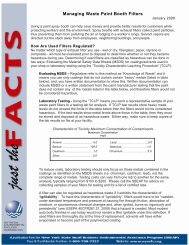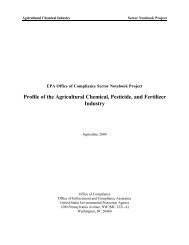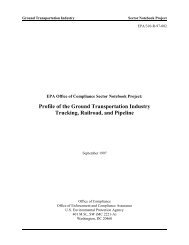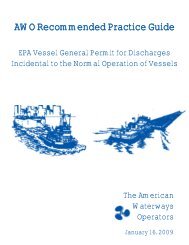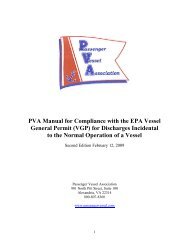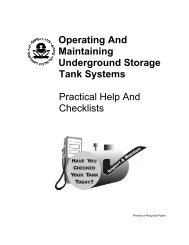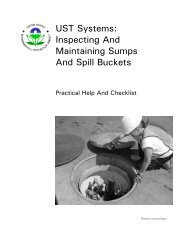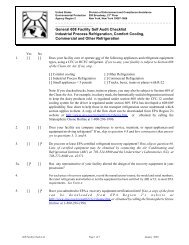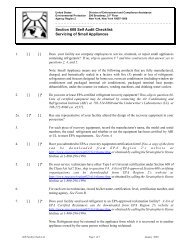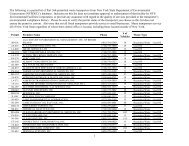2008 Sector Performance Report - US Environmental Protection ...
2008 Sector Performance Report - US Environmental Protection ...
2008 Sector Performance Report - US Environmental Protection ...
You also want an ePaper? Increase the reach of your titles
YUMPU automatically turns print PDFs into web optimized ePapers that Google loves.
Manganese accounted for about one-third of the total determined that the industry beneficially reuses 2.6 million<br />
pounds disposed. As shown in Table 3, lead and copper tons of sand per year, representing 28% of the total tons of<br />
were the chemicals most frequently reported as disposed. sand available for reuse. The most common barrier to reuse<br />
The sector’s disposals and other releases were driven by that respondents noted was lack of a local market for used<br />
ferrous metal casting facilities, which accounted for 75% of foundry sand. 20<br />
disposals and releases.<br />
Table 3<br />
Top TRI Disposals 2005<br />
Absolute Number of<br />
Pounds Facilities<br />
Chemical <strong>Report</strong>ed 1 <strong>Report</strong>ing 2<br />
Aluminum 7,709,000 3 31<br />
Chromium 7,112,000 149<br />
Copper 1,775,000 210<br />
Other <strong>Environmental</strong><br />
Management Activity<br />
The North American Die Casting Association (NADCA)<br />
promotes environmental management systems for die<br />
casting operations, and recently published a book titled<br />
<strong>Environmental</strong> Management for Die Casting. The book has<br />
been given away to NADCA corporate members and has<br />
been sold to more than 75 other die casting operations<br />
around the United States.<br />
Lead 1,983,000 270<br />
NADCA has further developed a series of questions for<br />
owners so they will understand where their operations<br />
Manganese 14,938,000 187 stand in terms of environmental compliance for air, water,<br />
Nickel 556,000 162 and solid waste. More than 30 companies have used this<br />
Zinc 9,636,000 63 system to evaluate themselves. 21<br />
Percentage of<br />
<strong>Sector</strong> Total<br />
96% 4 60% 5<br />
Notes:<br />
1. Total sector disposals: 45.7 million lbs.<br />
2. 662 total TRI reporters in the sector.<br />
3. Red indicates that the chemical is one of the top five chemicals reported in<br />
the given category.<br />
4. Chemicals in this list represent 96% of the sector’s disposals.<br />
5. 60% of facilities reported disposals of one or more chemicals in this list.<br />
Source: U.S. <strong>Environmental</strong> <strong>Protection</strong> Agency<br />
Promoting the beneficial reuse of foundry sand is a priority<br />
for EPA and for the American Foundry Society (AFS).<br />
Recent efforts to increase beneficial reuse rates appear to<br />
be paying off, as more sand is reused now than ever before.<br />
With input from the National Center for Manufacturing<br />
Sciences and EPA, AFS developed a survey to help quantify<br />
the amount of sand available for reuse, characterize current<br />
reuse practices, and identify barriers to reuse. Based on<br />
the 244 responses and a broader telephone survey, AFS<br />
Spent Foundry Sand<br />
Used in Rain Gardens<br />
In June 2007, the city of Seven Hills, OH, partnered<br />
with a commercial landscaping supply company, Kurtz<br />
Bros., Inc., to install a rain garden on community<br />
property near City Hall. A rain garden is a landscape<br />
that filters stormwater to remove impurities before<br />
the water enters storm drains or surface water. Spent<br />
foundry sand was key to the rain garden soil mix. By<br />
purchasing bioretention soil made with spent foundry<br />
sand, the city paid about half as much as it would to<br />
purchase soil made with unused sand. Foundries paid<br />
less for Kurtz to remove the spent sand than they<br />
would to landfill the sand. 19<br />
<strong>2008</strong> SECTOR PERFORMANCE REPORT Metal Casting 77



